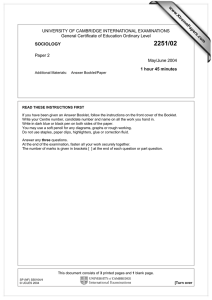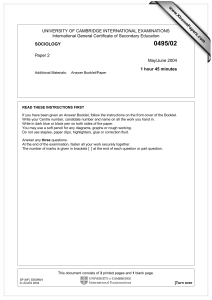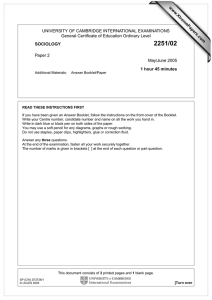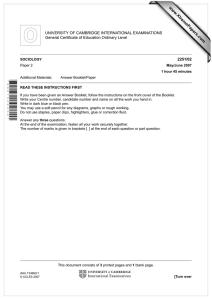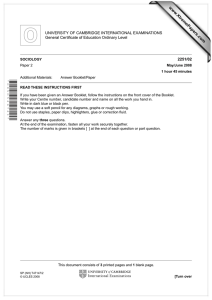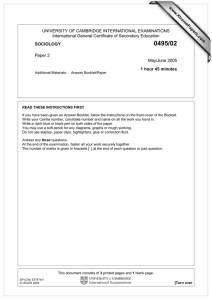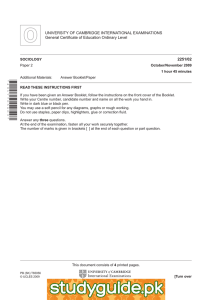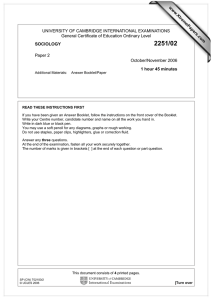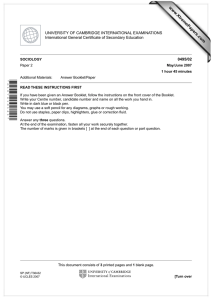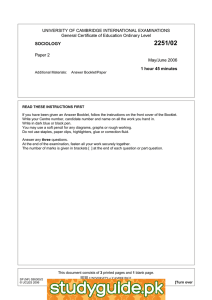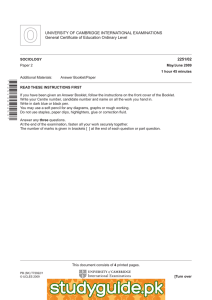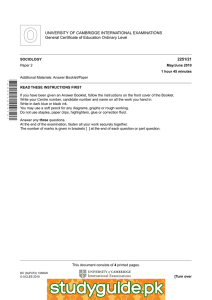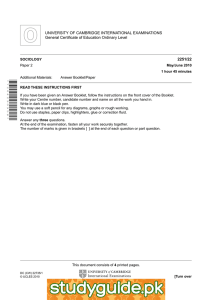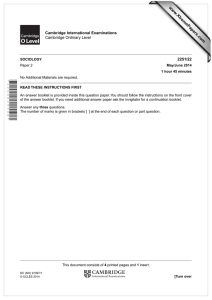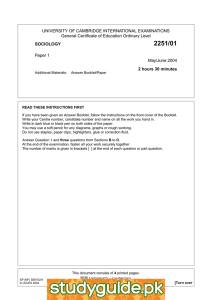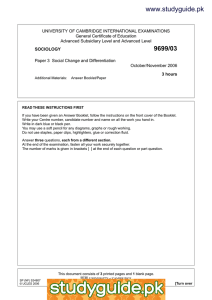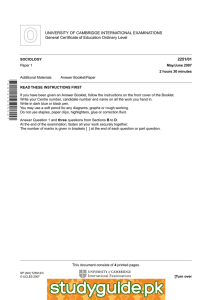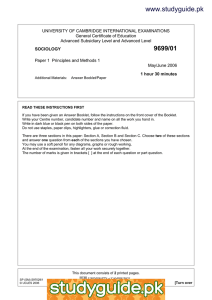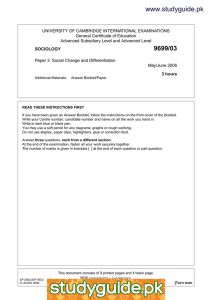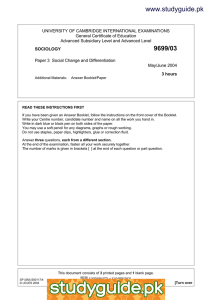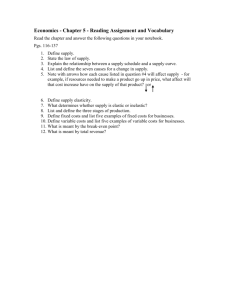2251/02
advertisement
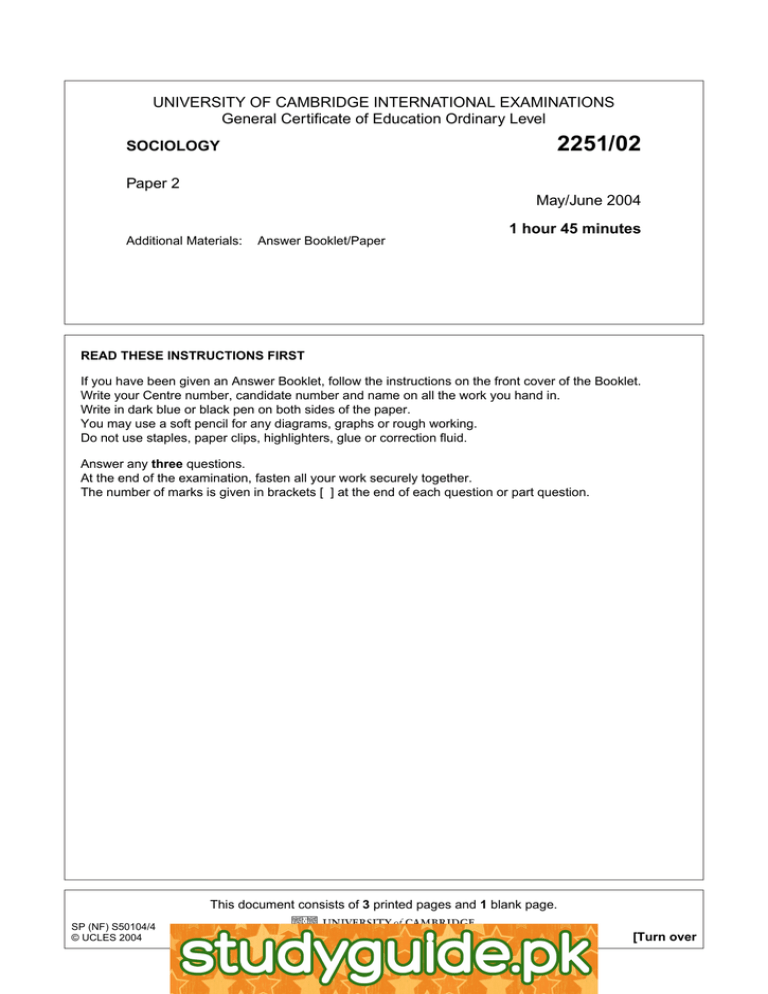
UNIVERSITY OF CAMBRIDGE INTERNATIONAL EXAMINATIONS General Certificate of Education Ordinary Level 2251/02 SOCIOLOGY Paper 2 May/June 2004 1 hour 45 minutes Additional Materials: Answer Booklet/Paper READ THESE INSTRUCTIONS FIRST If you have been given an Answer Booklet, follow the instructions on the front cover of the Booklet. Write your Centre number, candidate number and name on all the work you hand in. Write in dark blue or black pen on both sides of the paper. You may use a soft pencil for any diagrams, graphs or rough working. Do not use staples, paper clips, highlighters, glue or correction fluid. Answer any three questions. At the end of the examination, fasten all your work securely together. The number of marks is given in brackets [ ] at the end of each question or part question. This document consists of 3 printed pages and 1 blank page. SP (NF) S50104/4 © UCLES 2004 [Turn over www.xtremepapers.net 2 Section A: Family 1 2 The functions of families in modern industrial societies have changed, but that does not mean that families are less important than they were in the past. (a) What is meant by the term functions? [2] (b) Describe two functions that families perform in traditional societies. [4] (c) In what ways have the functions of families changed as societies have modernised? [6] (d) In what ways are families as important today as they were in the past? [8] There has been a steep rise in the divorce rate in modern industrial societies since the beginning of the twentieth century. However, divorce is not the only form of marital breakdown. (a) What is meant by the term divorce? [2] (b) Describe two forms of marital breakdown, apart from divorce. [4] (c) What factors may explain the rise in the divorce rate in modern industrial societies? [6] (d) What are the effects on society of a high divorce rate? [8] Section B: Education 3 Through the hidden curriculum pupils learn expectations regarding, for example, social class, gender and ethnicity. (a) What is meant by the term hidden curriculum? [2] (b) Describe two ways in which the hidden curriculum may influence gender roles. [4] (c) What part does the peer group play in influencing the values and expectations of pupils? [6] (d) In what ways may the educational performance of pupils be affected by the interaction they have with teachers? [8] 4 Differences in innate intelligence may help to explain why some people do better at school than others. (a) What is meant by the term innate intelligence? [2] (b) Describe two factors that may influence a person’s level of intelligence. [4] (c) What problems are there in using IQ tests to measure intelligence? [6] (d) What factors apart from intelligence may help to explain why there are differences in educational achievement? [8] © UCLES 2004 2251/02/M/J/04 www.xtremepapers.net 3 Section C: Crime, Deviance and Social Control 5 Some groups in society are more likely than others to be labelled deviant. (a) What is meant by the term deviant? [2] (b) Describe two groups in society who are likely to be labelled as deviant. [4] (c) Which groups in society are most likely to have the power necessary to label others as deviant? [6] (d) What are the likely consequences for a group that has been labelled deviant? 6 [8] Official crime statistics may be misleading and always need careful interpretation. (a) What is meant by the term official crime statistics? [2] (b) Describe two reasons why people may fail to report crimes to the police. [4] (c) Why do so few white-collar crimes appear in the official crime statistics? [6] (d) In what ways may the official crime statistics be influenced by the activities of the police? [8] Section D: Mass Media 7 More people watch television than are exposed to any other form of mass communication, and so the images and messages presented may be influential. (a) What is meant by the term mass communication? [2] (b) Describe two reasons why children may be influenced by the images and messages presented on television. [4] (c) Why might it be a matter of concern in a democratic society that a few powerful individuals own most of the television channels? [6] (d) What explanations have been offered for the ways in which the media may influence behaviour? [8] 8 Newspapers do not simply reflect the world as it is. They filter and select the events they report and this sometimes leads to accusations of bias and distortion. (a) What is meant by the term bias? [2] (b) Describe two examples of how selective reporting may lead to bias and distortion. [4] (c) What factors influence journalists in their selection and presentation of news reports? [6] (d) What can members of the public do to counter bias and distortion in news reporting? [8] © UCLES 2004 2251/02/M/J/04 www.xtremepapers.net 4 BLANK PAGE University of Cambridge International Examinations is part of the University of Cambridge Local Examinations Syndicate (UCLES) which is itself a department of the University of Cambridge. 2251/02/M/J/04 www.xtremepapers.net
